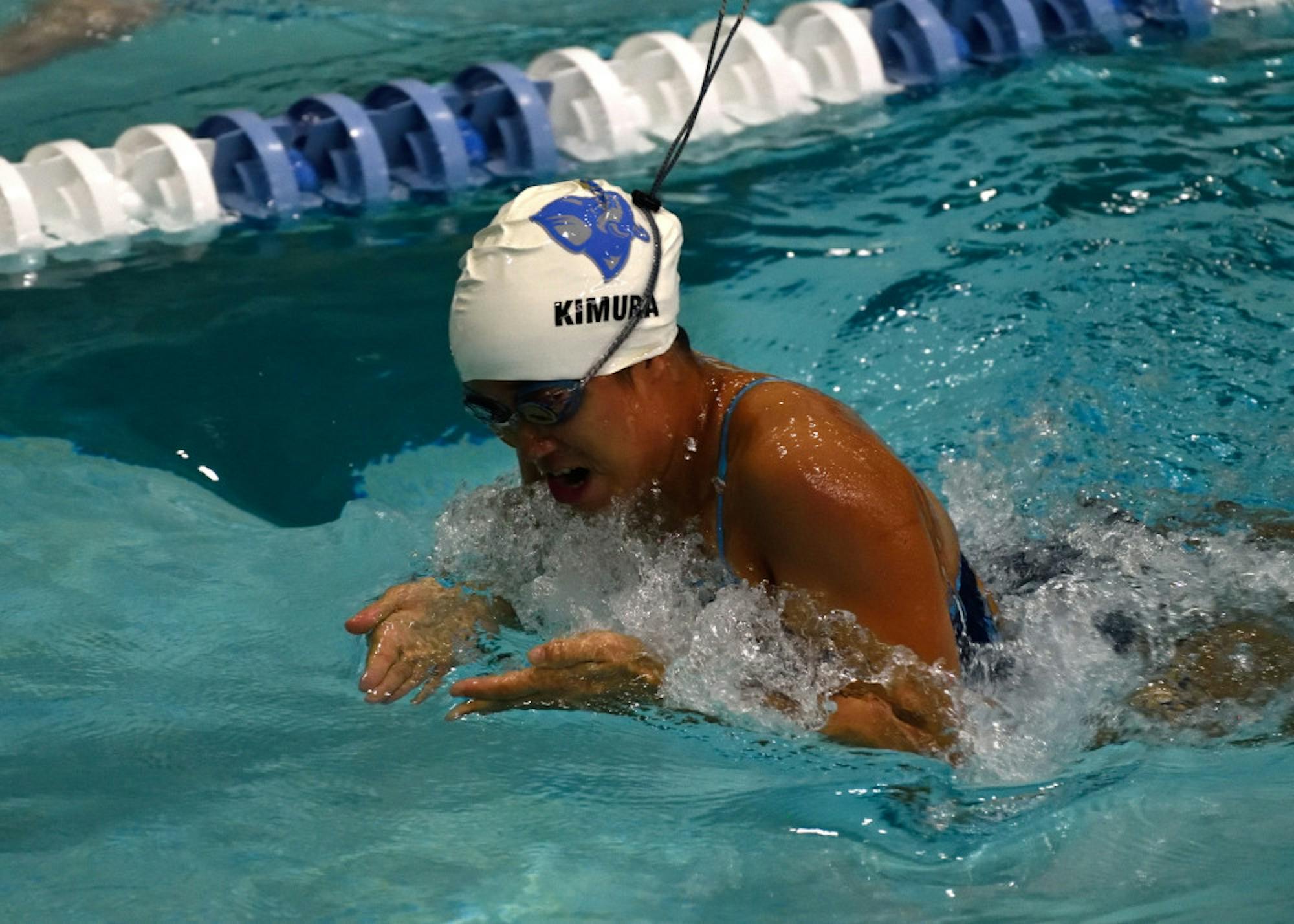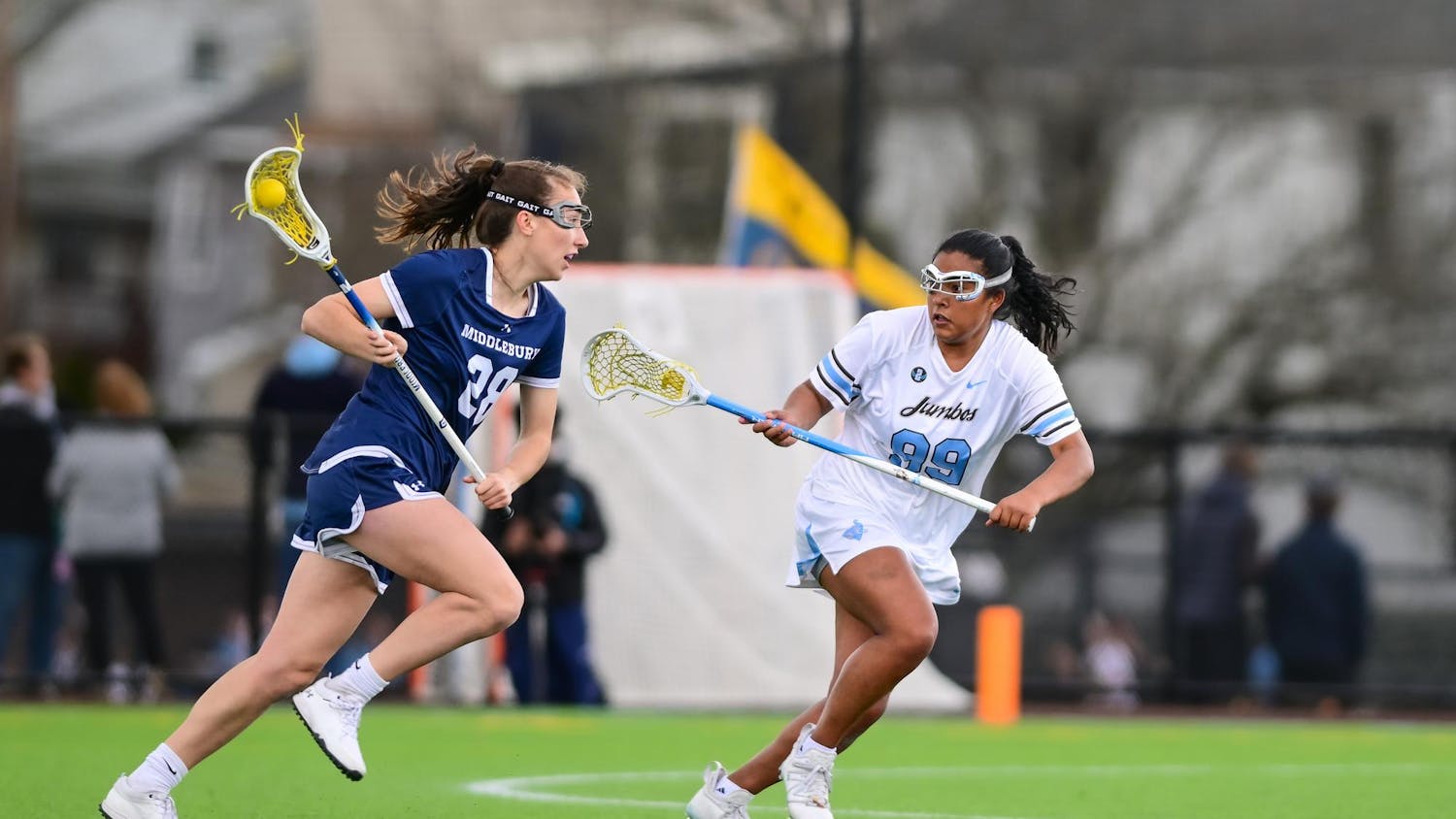The Tufts women’s swimming and diving team made one last splash ahead of the upcoming NESCAC championships, participating in the Middlebury Invitational over the weekend. With the Jumbos competing under a few different premises — some sought to prepare for NESCACs, while others looked to finish their seasons on a high note — there were many impressive results.
First-year Tara Zhou took home first place in the 100-yard backstroke, smashing her seed time by over three seconds with a mark of 1:00.96, while senior Kelsey Gallagher placed second in the event, less than two-tenths of a second behind her teammate. Gallagher later added a third-place finish in the 200 backstroke (2:12.85). Senior Lindsay Partin impressed by swimming her way into second place in both the 100 and 200 breaststroke (1:09.14 and 2:30.17, respectively).Junior Tessa Garces was also part of the brigade coming in second, finishing the 200-yard butterfly in 2:10.33.
The meet was especially noteworthy for Tufts' young guard, with many underclassmen recording solid showings. In addition to Zhou's performance, first-year Amber Chong impressed in the 1-meter diving competition, gaining 404.3 points to come in third place. First-year Abby Claus rounded out the Jumbos' third-place finishes, taking third in the 500-meter freestyle (5:13.40), just ahead of fellow first-year Sook-Hee Evans, who placed in fourth with a time of 5:14.19.
"We had a number of women [for whom] this was their last meet of the season. It was a fast pool, it was a great opportunity for them to go fast," coach Adam Hoyt said. "We rest them appropriately for the meet … [and] we had a number of lifetime bests. For them it gives them an opportunity to see improvement from one year to the next, [to see] adjustments to their stroke technique and whatnot."
The Jumbos have also been focused on a larger objective for the last few weeks: the annual taper. "Tapering" is a staple of championship season, founded in the notion that success in the pool requires a measured training regimen, rather than a heavily intensive one; there is extra emphasis on rest and recovery leading up to important meets.
"The concept [of tapering] is very basic," Hoyt said. "We work very hard through the season to train for one or two meets at the end of the year. All the work that our women do ... over the summer, during the preseason and during the season is leading up to the taper. Taper in the most basic sense is getting people healthy. The amount of time they’re spending in the pool and at practice is less in hope that they … can let their body rest and lower their stress level leading up to championships."
Evans explained the practical aspects of the team's tapering period.
"For the two weeks before [the meet], practices get shorter and shorter,” Evans said. "Sleep well, eat well, walk less [and] hydrate more.”
For the team's first-years, a methodical taper is likely different than one they experienced in high school. Hoyt, nonetheless, expressed how impressed he has been with the performance of the new class both in and out of the pool, regardless of any differences in routine.
"Our [first-year] class has been a special [addition] to the team. They’re talented swimmers and divers but importantly they’ve just been great teammates," Hoyt said. "It’s tough to know how they will perform at the biggest meet of the year with [extra] rest, but everything I’ve seen in them leads me to believe that they’re going to do great. They’re going to swim fast for us, they’re going to score points for us and they’re going to be a big part of our success at the NESCAC Championships."
With the Middlebury Invitational now in the rearview mirror, Tufts will focus on the conference championship meet, which commences Feb. 16 at Williams.The Jumbos are confident that they can improve on last season's eighth-place finish.
"We saw a lot of people who tapered swim really fast this weekend," Evans said. "That kind of got us all excited because that will be us in two weeks, hopefully."
Hoyt explained how the conference championship meet presents a particular challenge every year.
"NESCAC weekend is a marathon," Hoyt said. "It’s six sessions, and each is three-plus hours in length. To be able to keep your energy up, to keep your attitude where it needs to be [and] to keep your level of focus up is probably the biggest challenge for teams competing that weekend. That is the goal I will be looking for us to achieve that weekend. I know the effort will be there. If we can put together six sessions of high energy, high focus, the results will be there, as well."
With a boon from the first-years, to add to the already-impressive performances from upperclassmen at the Middlebury Invitational and previous meets, the NESCACs could be the successful culmination of a Tufts season that commenced with hard work in the summer and ended with a taper in the winter.
Jumbos make final postseason push at Middlebury Invitational

Senior co-captain Anna Kimura swims the breaststroke in a meet at Wheaton on Jan. 21, 2017.





